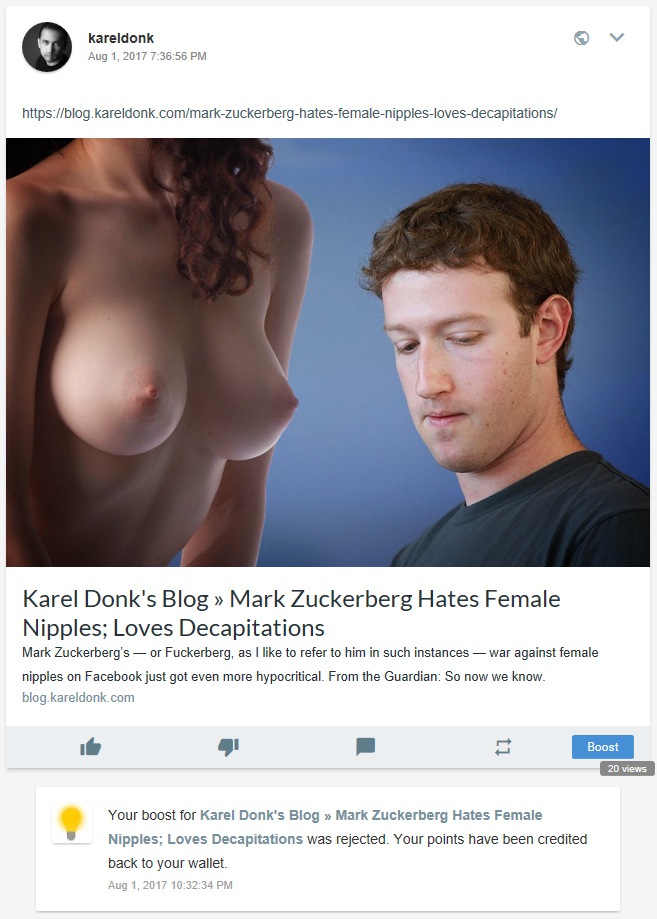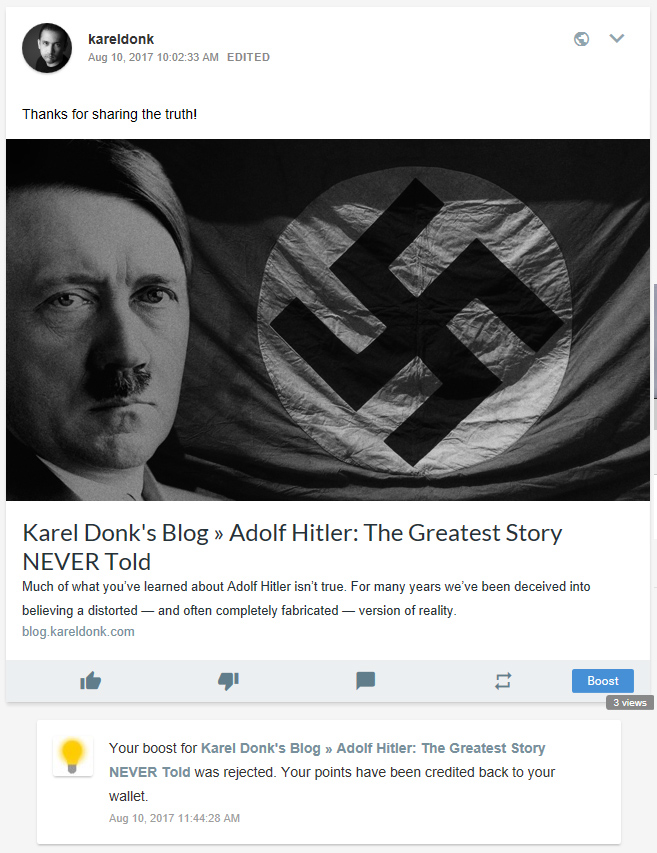Censorship on Minds.com; Pay attention Bill Ottman
In June 2017 I learned about a new social media website called Minds.com. While criticizing other social networks for their role in censorship, Minds.com’s co-founder and CEO Bill Ottman claimed that there would be no censorship on Minds.com; in his words, “Minds is engineered for freedom of speech, transparency and privacy.” But my own recent experiences show that we can probably expect the same kind of bullshit on Minds.com that people are now dealing with on other social media networks like Facebook, Twitter and YouTube.
For example, after I had made the post below on my Minds.com profile I tried to boost it and it got rejected. No reasons were given.
After a while I tried to boost another post on my Minds.com profile and it also got rejected. Again, no reasons given.
And it’s important to note that the above post featuring a link to my blog post “Adolf Hitler: The Greatest Story NEVER Told” did get accepted and promoted on Facebook a while back, as I mentioned in a previous post. So in this specific case, Minds.com was even worse than Facebook.
Yes I know, my posts were not deleted and I wasn’t banned or prevented from posting on my profile — things that are prevalent these days on other social media websites like Facebook and Twitter. But preventing me from using the points I earn on the Minds.com to boost my own posts so that they can get more exposure is also a form of censorship. That’s why there’s a whole debacle around net neutrality for example; people have very valid concerns that certain speech might get less to no priority at all when a small group of people are able to decide which flow of information on the network is more important. In this way, you don’t have to delete people’s content or prevent them from posting it; instead you simply prevent their content from ever reaching ((m)any) people — often while they may not even realize it. YouTube has also announced some policies recently that boil down to this same kind of censorship strategy — simply prevent undesired content from getting exposure by artificially limiting its reach.
So by preventing me from boosting my content, Minds.com is preventing it from reaching ((m)any) people and my content is effectively being censored. Yet Ottman claims the following:
Ottman’s goal is to run Minds as a community owned and operated social media platform that rewards its users. “Minds channels organically reach 100 percent of their subscribers,” he said. “The Minds Boost feature expands reach even further through a system that rewards users for site activity with Minds points, a digital currency that may be exchanged for views on the Minds network at a rate of one point per view.”
Is that how you rewarded me, Ottman? By rejecting and censoring my posts? By preventing me from spending my earned points the way I want to?
It seems to me like Bill Ottman is just another Fuckerberg wannabe, in it just for the money, while pretending to be against censorship. The following quote by Ottman gives it away:
“Users may choose to be anonymous, if they wish, and free speech is limited only by U.S. law. The software is free, open sourced and encrypted end-to-end for maximum transparency and privacy, peer-reviewed at Minds.org.”
So you can bet your ass that when politicians and the US government come knocking on Ottman’s door to start censoring certain content, Ottman will be very quick to comply, just like Fuckerberg. Right now Minds.com probably isn’t big enough to start getting that kind of scrutiny, but I’m sure you can imagine that if my content gets rejected and censored now while they’re small, the censorship will only get worse once Minds.com gets bigger. And what’s the fucking use of end-to-end encryption when your content gets rejected and censored anyway? The government is simply going to point and laugh at you. You can use the most powerful encryption in the fucking universe, and it’ll be fucking useless if you can’t reach people.
And yet Ottman criticizes Facebook:
Ottman said companies like Facebook have it all wrong, and that machine learning software is no substitute for human judgment when it comes to deciding what content should be on a user’s page: “They are approaching these problems completely backwards, and it’s creating unnecessary censorship. Users should determine themselves whether their news is fake or not — not a Facebook algorithm. Likewise, users should determine themselves how/if they want to be targeted with ads.“
Well Ottman, where was my choice in the above instances? And where was the choice of other users on Minds.com to be able to see my content advertised and decide for themselves what to think of it? Where? We didn’t get to choose; you chose for us. You’re not any better than any other of the social networks that you criticized.
Updates
Update 14/8/2017: Another post of mine on Minds.com also got rejected for boost, featuring a picture of Hitler with a quote where he talks about the importance of truth.
It’s ironic given the things Hitler talks about in the quote.
Back in June when I first got to know about Minds and read some interviews with Bill Ottman online, I had high expectations when it comes to freedom of speech on that platform. But it turns out that we can expect the same violations of individual rights on Minds that are so widespread today on other social networks. One would have to be absolutely fucking stupid to trust a social network like Minds with their content and to rely on it for distribution.
Ottman replied on Minds.com to a link I had posted to this blog post of mine, claiming that “
That’s the same as YouTube claiming they aren’t censoring content by making sure it can’t be discovered or monetized. Effectively that’s censorship, and that’s the point I made in my post. If you block content from boost it’s a form of censorship. It’s suppression of info. Who decides what is appropriate or not for boost? This is highly subjective, and consider that it can only get worse in the future. You just have to look at what’s happening at Facebook and YouTube to know where it’ll ultimately be heading. Consider that today you’re at Minds.com, but maybe in a few months or years you won’t be; who will be calling the shots then regarding what’s appropriate or not for boost?
For example, a few days ago I saw an interview with independent journalist Luke Rudkowski about the fact that around 660 of the videos on his channel got demonetized by YouTube recently. I had already mentioned above that YouTube started implementing strategies recently to prevent undesired content from getting exposure by artificially limiting its reach. Demonetization is also a way in which they discourage people from making content that goes against their views, which, as I’m sure they’re hoping, will cause people to share and promote less of it, effectively resulting in (self)censorship.
So my recent experiences on Minds only reinforced my findings that the only reliable communication on the internet is truly Peer to Peer (P2P) communication where there’s no central authority and no central point of control, and where each individual has full control over their content and speech at all times. You’d be a fool to trust anyone else with your content and to become dependent on them, especially large corporations such as Facebook, Google and YouTube.





Comments
There are 69 responses. Follow any responses to this post through its comments RSS feed. You can leave a response, or trackback from your own site.